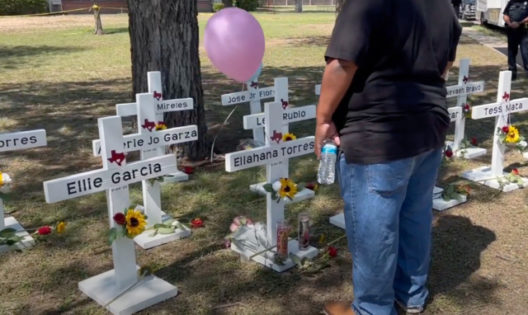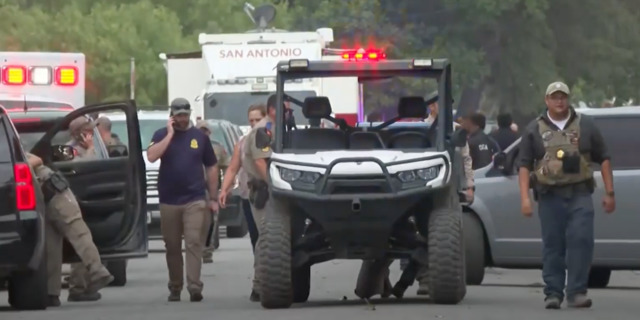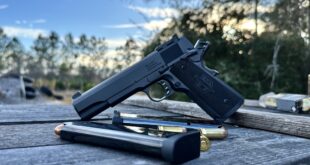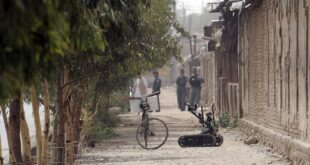by Amaris Castillo
San Antonio Express-News editor Nora López talks about her newsroom’s struggle against authorities to tell the stories of Uvalde.
By now, many who have been following this story know that the official narrative of the tragedy that left 19 students and two teachers dead has shifted, with early accounts being amended or retracted.
The San Antonio Express-News published a timeline detailing the series of mistakes and deviations from original reports that officials made following the mass shooting at Robb Elementary School in Uvalde, Texas. The New York Times also provided a clearer picture of the police response, including that officers delayed confronting the gunman for more than an hour, even though supervisors at the scene had been told that some trapped with him in two classrooms needed medical treatment.
Over the past two weeks, Nora López, executive editor of the Express-News, has led her staff in covering this story. The job has been made more difficult, she said, by the obstacles facing her reporters and photographers. Visiting law enforcement officials and bikers obstructed reporters’ abilities to cover the funerals of victims.
“In addition to the trauma of covering such an event, then to have to deal with all this harassment and attempts to stop us from reporting this story has been really disconcerting,” López said.
The Express-News and the Houston Chronicle (which are both owned by Hearst) sent a whole team of reporters and photographers to Uvalde after the shooting. But now she said they’ve scaled back to just one reporter and one photographer. She remains steadfast in a commitment to telling the stories of families still reeling from their loss.

This month, López spoke with Poynter about the work to continue covering the story of the Uvalde shooting victims and their families, and the obstacles journalists are facing in doing so.
This interview has been edited for clarity and brevity.
What have the past two weeks been like for your newsroom in covering the mass shooting in Uvalde?
It’s been pretty intense, just in and of itself … a mass shooting with so many people who were killed, children especially. It’s been a difficult story, but it’s been made all the more difficult by the problems that we the media have encountered with law enforcement and authorities in Uvalde. That has been a whole other issue that we’ve had to deal with. In addition to the trauma of covering such an event, then to have to deal with all this harassment and attempts to stop us from reporting this story has been really disconcerting.
I’ve heard that some officials have been stonewalling the press in town. Can you tell me more about that?
We’ve had reporters on the ground who have been harassed. Last Thursday, there were groups of motorcycle gangs that we believe are former police officers. They were physically getting in front of reporters and videographers, and using their body and their hands to try to obstruct the sightlines. The motorcycle gangs kind of backed off a little bit on Friday, but through the weekend, the police that’s been there helping with the situation continue to do the same thing …
I can understand they’re trying to control all this media that’s descended on this little town. We, the media, are used to having designated areas where they ask us to stay and stand, and then they come and give us updates. But even in this case, they’ve put up fire engines to block the view of the church or the funeral home — even the cemetery. Now they’re putting up blockades around the entire block where the funeral home is. So now we can’t even walk across the street to the corner there. They are like, ‘No, you can’t be here,’ even though it’s a public sidewalk.
There’s about a dozen police departments in Texas who have sent volunteers to help the Uvalde police. So some of this has come from these visiting jurisdictions, which is just really bizarre because they’re out of their jurisdiction. They don’t have the power to do anything. If they want to arrest us, they have to call in the Uvalde police. … They keep threatening to arrest us, but so far they haven’t. It’s been really hostile. There’s the concern that they are violating our constitutional rights, because we have the right to news gather. I believe that this is bordering on official oppression in stopping us from talking to people and doing my jobs.
The other equally disconcerting thing to me is that they’re also discouraging families from talking to us because they’re hustling them along. Even families who have agreed to talk to the media, they’re basically saying, ‘No, you shouldn’t. You need to move, you need to just move along quickly.’ That’s my biggest concern, that they’re actually now stopping people who want to talk to us, from talking to us.
I imagine this makes it a lot more difficult to tell the stories of the victims’ families, including those, like you said, who want to share their story with the world. What are we missing if we don’t hear from them?
We’re missing out on the stories of who these young children were, and that’s very important for this narrative because people need to realize that these are real children whose lives were cut short. The other thing that it’s impeding us from is interviewing survivors who might be able to give us firsthand accounts of how the situation unfolded — those eyewitnesses to help reconstruct what actually happened that day. That’s particularly important right now, given the lack of information that authorities are giving us. To me, this feels like an effort to control the narrative. It’s in their self-interest for us not to talk to the family or to the survivors.
I spoke to a broadcast journalist a few days after the shooting about the conflicting information from authorities on what occurred, as far as police response. What has your newsroom’s experience been like in trying to sort through all this and report the facts?
It has been very frustrating because we’re hearing a little bit here and there, and it doesn’t line up. We still don’t have the full story about how these things unfolded. There’s a lot to account for in that time that they waited before finally going in. What’s really troubling is that some of these things that we now know, it seems pretty obvious that they should have known it when they had that first press conference.
For example, the teacher who they said had left the door open, and that that’s how the gunman had gotten in. The video shows that she had opened it to go get something from the car, but when she saw that there was this guy with a gun outside — and somebody from the funeral home across the street yelled at her (about) this guy with a gun — she closed it. They have this on video. They knew that she had indeed closed the door. And she thought it was locked and apparently it wasn’t locked, so now they’re investigating that. They knew that from day one. … That’s what’s been really disturbing. Why wouldn’t they tell us that to begin with?
And you’ve been in the news business for more than three decades, and you have also been a police reporter, correct?
Yes. I’ve been a police reporter here. I covered cops in Dallas, in Fort Worth, and some of the smaller communities between Dallas and Fort Worth. I have never seen anything like this. As journalists, we have a healthy distrust of (officials), but as a former police reporter going out to the scene and speaking to the sergeant on duty, you expect that they’re giving you the facts as they know them. Now we see that they didn’t give us all the facts in that press conference.
Have you seen police misinformation like this before?
No. Never.
Your newspaper published commentary from one of your staff about how the police’s stonewalling the media appears to be a coordinated effort in Uvalde. Why was it important to make this statement?
Because we have to let the public know what’s going on in Uvalde and, more importantly, we have to let the Uvalde city officials know that we’re not going to be scared away. In fact, we’re going to report on this and we will continue to go back. We’re the largest daily that’s closest to this community, and it’s incumbent on us to stay on top of the story no matter what.
We’ve been in communication with Hearst legal (on) whether or not we should take legal action. I don’t think we have anything yet. We’ve crafted a letter that we’re going to send out to all the departments who are represented right now in Uvalde, reminding them of our First Amendment right to gather news. We’re also directing our reporters to not engage them … even if you’re standing on a public sidewalk or street, take down their name, their badge, ask them ‘Why are you threatening to arrest me? Under what law, what statute?” and just documenting. At the end of the day, move, and don’t get terribly argumentative. So we’re having to give them advice. There was a point where we were basically discussing whether we have to get security for our reporters, to protect them from the police. … I know other TV stations did do that.
Have you heard anything else from your team reporting in Uvalde that you didn’t expect?
No, so far that’s it. Again, this whole issue of them having a chilling effect on the residents of the Uvalde. Now we’re starting to hear stories that even those people who do want to talk to us are now afraid to talk to us.
That’s so unfortunate. We’ve been learning more over the past few years about the vicarious trauma that journalists can carry after covering traumatic events. What have you done to assist reporters and editors who have been covering Uvalde?
We are bringing in some counselors this week, making them available to our reporters and encouraging them to make use of them and talk to them and set up some therapy if they feel they need it. Over the weekend I reached out to reporters to try to talk to them and recognize their anxiety and their fear. As of Friday we are having a reporter and a photographer team up together and we’re telling them to not go out alone … just to help them feel a little bit safer. Both myself and my editor have tried to reach out individually to the reporters and assure them that we’re talking to legal and we’re doing everything we can to protect them, and encouraging them to seek out counseling if they need it.
What is your goal in continuing to tell the story of Uvalde?
Our goal is to shine a light on this community, to document their recovery, and to talk to survivors who can help tell us what happened here so that hopefully people can learn lessons from it. At the end of the day, it’s our job to show the world the impact of such a tragedy and the impact it has on a small community, and how do you recover from it. We’ll be focused a lot on the recovery of survivors who may have injuries that they have to live with for the rest of their lives. Our hope is to bring those stories to a wider audience, so that they can really know and understand who the people of Uvalde are, and how they’re going to be able to move forward. I think that’s all part of the healing process, as well.
This article was originally published by The Poynter Institute and is republished here with permission.
 Soldier of Fortune Magazine The Journal of Professional Adventurers
Soldier of Fortune Magazine The Journal of Professional Adventurers






